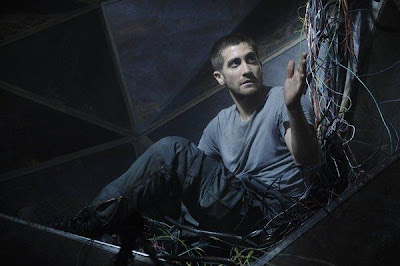Since Duncan Jones' success with 2009 cult sci-fi hit Moon he has clearly not taken a break. Instead the director has been working on his latest sci-fi thriller Source Code from a script by Ben Ripley, and like Moon, it's easy to picture this film also reaching similar cult status.
The plot is rather complicated to explain (although easy to follow) and to keep any spoilers firmly under wraps it would be best to avoid any lengthy descriptions. However, the basic premise follows Jake Gyllenhaal as Capt. Colter Stevens, a trained helicopter pilot who has served in Afghanistan, who via an (updated)modern and ingenious technology known as the titular "source code", is transported into the last eight minutes of a man's life before the train he is on explodes and blows everyone to smithereens. His mission is not to avert the incident, but instead to try and identify the culprit before the eight minutes is up and the bomb explodes. The elusive military agency controlling the source code are capable of sending him back as many times as necessary, although time is running out as the bomber is planning a greater attack later in the day, and identifying him is key to the prevention of the later attack(s).
With few directors would this script be in safe hands; aside from the obvious choices such as Ridley Scott, Chris Nolan and J.J. Abrams, Duncan Jones is the perfect choice - a new director who has proven his hand with sci-fi, and more importantly, substance over style. That is not to say that style takes a back-seat at any point in Source Code, quite the opposite - the constant deja vu of our hero awakening in the same scenario is devoid of any mundanity or repetition, as the feel is always different - which the hero himself notes, "it's the same, but different". Like Jones' debut feature, Source Code sees a lone protagonist, or isolated man, as he embarks upon a quest to save mankind, and his own identity. It's as though Capt. Stevens has been given a chance of redemption to save lives after his training has led him to destroy lives in the US Army, and never does Gyllenhaal's motivation wane - the film maintains breakneck speed throughout. After Tony Scott's speedy thriller Unstoppable it seems that trains are the 'transportation mode of the hour', and the constant awareness of the dangers faced at the speed they are travelling serves to accentuate the thrills - will our hero stop the culprit? Can he save the girl? Will his eight minutes time-out for good?
Source Code plays out as a massive denouement as though a myriad of threads are slowly intertwined (or untangled - not sure which?!), but at no point is it very confusing because Jones gives us just enough information to sate the appetite for answers - we see one scene where Capt. Stevens (in the grimy cockpit of the "real world") starts pounding questions at his commanding officers via a screen-phone - and much to our relief, they actually give some answers.
This latest sci-fi slots neatly between the Inception and The Adjustment Bureau - two recent films, that like Source Code, owe a lot to Philip K. Dick (especially Bureau since he wrote it!) and the sheer mind-bending scale of his work. Identity, time-travel, space and love are all recurring themes in Dick's work, and all are very much present in this film. Source Code could be said to have the intricacy and detail of Nolan's masterpiece with the characterisation and romance of The Adjustment Bureau - the perfect combination of the two. It is one of those rare films which has you genuinely thinking hard about the ending out of pleasure rather than necessity. I left the cinema understanding the ending, but wanting to ponder it longer. Source Code is a well-crafted sci-fi thriller, and for sheer enjoyment and adrenalin it beats all the films released in 2011 thus far.


No comments:
Post a Comment